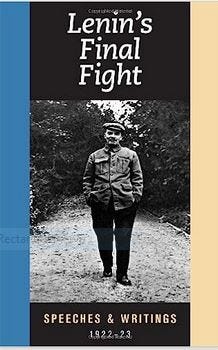A few days ago I re-read the book of Lenin's final years’ speeches and letters. The book covers the years 1922 and 1923 (Lenin died in January 1924). I grabbed the book simply because I saw it on my bookshelf and having read it probably twenty years ago I could not remember exactly what was there, and thought, as I was proof-reading the section on inequality in socialism in my forthcoming “Visions of inequality”, that there could be something in the Lenin book that might be relevant for my chapter. In reality, there was nothing.
But there were several topics that have not lost their relevance even 100 years later. There are at least two that are very relevant today: Lenin's views on the New Economic Policy (NEP) and state capitalism, and his views on the nationality problem during the process of the creation of the Union of Soviet Socialist Republics. (Even the name was still debated: Lenin writes of the Union of Soviet Republics of Europe and Asia.) I will discuss the first topic only.
In a very long speech (which takes 50 closely printed pages) to the 11th Congress of Russian Communist Party in 1922 Lenin summarizes the results of the first 18 months of the New Economic Policy. (I also use his speeches to the Comintern Congress in 1922 and to the Moscow Soviet the same year.) He presents NEP as a necessary retreat from the construction of socialism. Why was the retreat needed? First, in order to restore the links with the small-holding peasantry who during the War Communism curtailed their output as there was nothing to exchange it for (as the industrial production plummeted), and second, to learn how to manage the economy. “Learn from capitalists” could have been the key slogan of the NEP.
Lenin argues that Communists, having studied ideology and the technique of political struggle, simply do not know how to manage the economy: “Communists do not know how to run the economy… they are inferior to the ordinary capitalist salesmen who have received their training in… big firms” (p. 35); “we must organize things in such a way as to make possible the customary operation of capitalist economy...because this is essential for the people” (p. 41). It was not part of Communists’ tool-kit. They have gained political power but they do not know how to use it to make the economy work. They are utterly bureaucratic and thus they mismanage the economy. (Lenin has a ten-page “excursus” on how complicated it was to buy canned food when hunger reigned in Moscow because different Soviet bureaucratic bodies could not agree among themselves. Finally the issue came to the Politburo and it was decided there. Lenin exclaims: “But Kamenev [the Politburo member} cannot be dragged into every transaction, dragged into the business of buying canned food from a French citizen”, p. 57).
But he fails to recognize, and perhaps it was difficult to recognize at that time, that the problem was not just learning how to manage large enterprises but that there was a problem of incentives. It was not that the Communists were necessarily worse in management skills than capitalists. The problem was that the incentive structure is very different for a bureaucrat or a manager who runs a large state-owned company from the incentive structure faced by an individual capitalist.
For Lenin, however, the problem lied in lack of knowledge of management: he would have loved MBAs and mentions as a very positive development, the creation of a similar institute in Moscow and the role of the journal Ekonomicheskaya Zhizh as somewhat of a Soviet Forbes (in today’s terms, obviously). The problem, Lenin believed, could be remedied by working alongside capitalists in the so-called mixed enterprises created by the state, and Russian and foreign capitalists (14 of them existed at the time of Lenin’s 1922 speech) and by imitating capitalists’ skills.
NEP is a learning experience; once Communist cadres have learned how to do business, and run the economy, NEP can be shut down (“state capitalism is capitalism that we shall be able to restrain, and the limits of which we shall be able to fix”, p. 40). The justification of the NEP is thus that while it is a retreat from the ideals of socialism it is a temporary retreat and after its objectives have been achieved, future advances will be much more powerful because better organized and sustainable. And the country would be richer.
In that context, Lenin discusses state capitalism. He makes a distinction between (a) state capitalism under capitalist conditions, and (b) state capitalism under socialist conditions. He rejects the view that the two of them are the same, and he criticizes Bukharin who wrote that the term “state capitalism” under socialism is a logical absurdity. In Lenin’s view (a) is when the state, ruled by the capitalist class, takes over some of the private-sector functions while the substantial part of the economy remains capitalist. And there is (b), state capitalism where the state is controlled by the Party and the proletariat, and allows capitalists to function in order to boost productivity and to learn management skills from them. So state capitalism under socialism, according to Lenin, is entirely different, in the political sense, from state capitalism under capitalism. The political power is not vested in the hands of the capitalist elite and this enables Communist rulers whenever they decide to do so to curtail capitalists’ involvement in the economy. The power remains solidly with the party.
This last point is very relevant for the understanding of the Chinese approach to state capitalism today. As I have argued before, we can see the current Chinese state capitalism as a protracted NEP that began in 1978 and continues until today. But Lenin seems to overlook the possibility that with a very long NEP the economic and political power will gradually seep from under the Party and the very nature of the state would change. Those who have money will dictate things as in capitalist countries. The state may not be able to control them and the commanding heights of the economy may change ownership. This happened under Jiang Zemin and Hu Jintao: the development of state capitalism under socialist conditions led to the increasing influence of rich people and capitalists, including their inclusion in most of the party organs, and through the idea of “The Three Represents”, it gave a pretense of ideological acceptability to such evolution. The change in the elite composition, evident in a study done by Li Yang, Filip Novokmet and myself, is another product of such policies. The social structure of the Chinese elite had enormously evolved between the late 1980s and 2013 (when our study ends). While the private sector was marginal among the elite (the top 5 percent) in 1988, twenty-five year later almost one-third of the people in the elite were private businessmen (owners of small enterprises and large scale capitalists). If one includes professionals who are employed in the private sector, a bit over one-half of the elite is private-sector dependent.
It is in this context that one can look at Xi Jinping’s policies: as an attempt at the reassertion of the power of the state vs. the capitalist sector and the rich. Or to use Lenin’s distinction between the two, as an attempt to move from state capitalism to state capitalism. It is an adjustment in the political power between the two sectors: the state, ruled by a bureaucratic stratum, and the rich. It represents the analog of the populist reaction in the Western democracies: the feeling that the business elite has become too powerful, has no discernable interest in the problems of ordinary people, and has to be reined in. We can thus see Xi Jinping as both a heir to Lenin’s New Economic Policy and in much more contemporary terms as a populist response to the excesses of the new rich.




The issues raised by this post are very important and extremely complex. They cannot be fully discussed in a comment section.
There are very serious Western scholars who consider Deng Xiaoping's reforms (which were actually not his, but the Party's; Deng only gave the general political direction to the reforms) a very similar form of NEP. I think this hypothesis is in the right direction and is certainly more true than the "China restored to capitalism" hypothesis that is dominant in the West nowadays. But it is incomplete.
It is crucial to have in mind that "China's NEP" was built on a very different -- much more favorable -- material base than the Soviet Union's. Most, if not all, of the modern-day Chinese capitalist class came from the poor/common peasantry, and they owe their position and status entirely to the socialist system. This is a totally different scenario because that means the Chinese capitalist class doesn't have a capitalist culture, set of ideas or political cohesion (organization). In the West, we have the old nobility who became the capitalist class or, in America, the nations were founded by capitalists (slaveowners), that is, the American nation-states were already born capitalist (liberal). During the Lenin era, the USSR had the problem of the kulak, rich peasants who owed their privileges to the czar's capitalist reforms of the 1860s and, by the time of his death, already had generations (life expectancy in Russia was extremely low; 64 years meant some four or five generations) of experience in ideology, politics and organization.
But Lenin's writings leave us a hole when we want to compare NEP with modern-day China. He died in early 1924. Later that year, the NEP got much deeper and worrisome, the capitalists seemingly taking over in a smooth and fast process. The situation was certainly worse than in today's China, many writings of the time giving socialism as finished. How the USSR managed to save socialism from NEP is one of the questions Edward Carr admits he didn't have an answer: he simply attributes it to sheer willpower of the Bolsheviks. Either way, if one wants to completely understand the NEP, one has to concentrate his or her studies in the years of 1924-1926, not 1923.
Besides, comparing Reform and Opening Up to the NEP doesn't answer the crucial question: why did NEP collapse in 1926-28, while R&OU is still alive and well today, more than 40 years later? Because few people in the West remind the fact that the NEP was never abolished from above: it collapsed under its own inner contradictions. The rise of Stalin (i.e. the rise of Socialism in One Country) only came after the fall of NEP, not during or before. It was the fall of NEP that created the vacuum SOC could fill, not the rise of SOC that imploded the NEP.
I remember sitting in a Belgrade cafe with some Very Leftist Friends having a discussion somewhat like this. I had just read Mann's Buddenbrooks, his novel covering several generations of a German bourgeois merchant family. There's a scene in which a Buddenbrook (as burgermeister) has to confront a red mob of peasants and workers who demand a republic. 'You have a republic' is all he says in reply. It's a good illustration of the trench between radical social politics and 'dollar rationality.' The Buddenbrooks were businessmen and knew how to calculate costs, work shipping and trade, make deals, etc. etc. I realized reading that book that actually 'running the economy' (or even a minor import-export firm) is a kind of knowledge entirely different from the socialist point of view. I brought up all this to my well-meaning and battle-scarred friends, but they all kind of demurred (there was plenty of rakija, I admit) but still, no one had any reply to that point. It's kind of a big deal, too, for any leftist concerned with anything real...